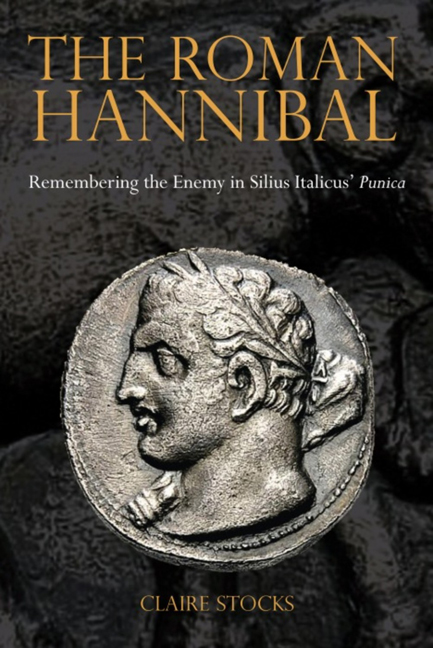Book contents
- Frontmatter
- Contents
- Acknowledgements
- Texts and Translations Used
- Introduction: Silius Italicus and the Roman Hannibal
- Chapter One The Roman Hannibal Defined
- Chapter Two Before Silius: The Creation of the Roman Hannibal
- Chapter Three Silius' Influences
- Chapter Four Epic Models
- Chapter Five Silius' Roman Hannibal
- Chapter Six Out of the Darkness and into the Light
- Chapter Seven Hannibal's Decline after Cannae: Separating Man from Myth
- Chapter Eight Imitators and Innovators
- Chapter Nine Band of Brothers
- Chapter Ten The ‘Lightning Bolts’ (Fulmina) of War
- Chapter Eleven The Man and his Myth: The Self-Defined Roman Hannibal
- Conclusion: The Crossing of the Worlds: The Move from Internal to External Narrative
- Bibliography
- General Index
- Index locorum
Chapter Seven - Hannibal's Decline after Cannae: Separating Man from Myth
- Frontmatter
- Contents
- Acknowledgements
- Texts and Translations Used
- Introduction: Silius Italicus and the Roman Hannibal
- Chapter One The Roman Hannibal Defined
- Chapter Two Before Silius: The Creation of the Roman Hannibal
- Chapter Three Silius' Influences
- Chapter Four Epic Models
- Chapter Five Silius' Roman Hannibal
- Chapter Six Out of the Darkness and into the Light
- Chapter Seven Hannibal's Decline after Cannae: Separating Man from Myth
- Chapter Eight Imitators and Innovators
- Chapter Nine Band of Brothers
- Chapter Ten The ‘Lightning Bolts’ (Fulmina) of War
- Chapter Eleven The Man and his Myth: The Self-Defined Roman Hannibal
- Conclusion: The Crossing of the Worlds: The Move from Internal to External Narrative
- Bibliography
- General Index
- Index locorum
Summary
To sow the seeds of furor (1.79) – to reconceive the Roman Hannibal – is the defining aspect of the Hannibal-centric, early books of the Punica. Cannae, fulcrum to the epic and fulcrum to Hannibal's military assent and descent, affirms Hannibal's status as a super-uir of the epic: he has become a figure men dread (e.g. 1.466) rival to the gods (e.g. 4.1–5), an individual whose words and achievements so inspire his men that they become imbued with his spirit (e.g. 1.345–6). Avenger of Dido, instrument of Juno, offspring of the Barcids; admired, loathed, feared.
Hannibal is presented as the best and worst that Rome has to offer by being both the purveyor and diametric opposite to Jupiter's idealised picture of Romanitas, through his improba uirtus (1.58), blood lust (1.59–60), and martial excellence (e.g. 1.265–7); and he acts as an exemplum, establishing a pattern of behaviour that is repeated by Scipio Maior at the Ticinus (4.421–2) and Paulus at Cannae (10.27–30, 293–7). In the first ten books of the Punica Silius’ Hannibal, in recreating his credentials as the Roman Hannibal, is the man and myth combined. In the latter half of the epic this situation changes: the now fully fledged myth, epitomised by the motif of Hannibal ad portas (10.265–6), becomes separated from the man in his decline. When Hannibal the man fails to live up to his reputation, Marcellus, Hasdrubal and others emerge to fill the gap, engaging with Hannibal's mythic identity by replaying his earlier achievements – Marcellus in re-enacting the siege of Saguntum, Hasdrubal in crossing the Alps.
Hannibal at Capua: The point of separation
Capua, cited by Livy as the reason Hannibal fails to take Rome (e.g. 23.18.10–16), is the most overt point of separation for the man and his myth as Hannibal turns aside from war, leaving behind hardship and the path of the ideal Roman, and succumbing to luxury.
After Cannae, Hannibal fully intends to march upon Rome, but is prevented by a dream from Juno warning him not to attack the city (10.357–71). Juno is disturbed (turbata, 10.337) by Hannibal's plans, intent on curbing his incautious ardour (incautum ardorem, 10.339).
- Type
- Chapter
- Information
- The Roman HannibalRemembering the Enemy in Silius Italicus’ Punica, pp. 133 - 146Publisher: Liverpool University PressPrint publication year: 2014

